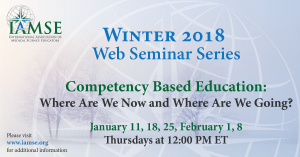
In case you missed yesterday’s Webcast Audio Seminar (WAS) Session, here are the highlights of this session:
Integration, Competence and Expertise: Preparing Learners for the Future
Presenter: Nicole N. Woods PhD
January 25, 12 PM ET
Discuss the current and future state of Competency Based Medical Education (CBME).
The Expert: The planned model of CBME and most educational programs is that at some point the individuals that enter and complete our programs will in fact end up as experts.
Medical education can be seen as the pathway that allows our learners to become experts.
What are a few of the assumptions we make as educators along this pathway prior to CBME?
Required Skill: assume students will have a set of required skills at the end of the journey or pathway.
Time: assume a certain amount of time that this journey to expertise is to take.
Single summit: everyone reaches the same place and there is only one-way to get there.
Inevitable: expertise is an inevitable outcome of the journey.
Some of these assumptions can be problematic. CBME has been proposed at many schools as an opportunity to address these assumptions/challenges head on.
1.Competencies are clearly articulated
2.Competencies are arranged progressively
3.Learning experiences facilitate the progressive development of competencies
4.Teaching practices promote the progressive development of competencies
5.Assessment practices support and document the progressive development of competencies
Core components of CBME are underlined above.
Keep in mind that CBME, like any approach to education will succeed or fail based on how it is implemented.
If we have not put into place the learning experiences, the teaching practices and the assessment practices to support the skills that our students need, all of this work will be for not.
Expertise Development: What does it mean to be an expert in a given field and what is the pathway to get there?
Most of the models agree that at the very least an expert must be able to efficiently and effectively perform all of the general, everyday tasks that make up their daily work.
Routine Work—Something you’ve seen before or know how to deal with.
According to Dreyfus and Dreyfus “when things are proceeding normally experts do what normally works”.
Here’s the challenge. Medical practice is not just about routine work.
Non-Routine Work – Something you’ve never seen before or don’t know how to deal with.
Useful models of expertise development tells us the expert must be prepared to deal with:
Complexity: problem that looks similar to other problems but now has an added level of complexity.
Ambiguity: problems and solutions are not always obvious.
Novelty: encounter something that they have never seen before. Expert is not able to just walk away.
Adaptive experts use existing knowledge to solve routine problems and are able to create new solutions to non-routine problems. Can deal with both routine and non-routine problems.
Adaptive expertise is not the sole trajectory of education.
We have a Goal.
We want to use CBME to create educational experiences that prepares students to become competent.
Competence is the ability to handle routine and non-routine aspects of clinical work.
Therefore, teaching strategies, learning experiences and assessment practices must prepare learner to handle routine and non-routine clinical problems in the future.
Adaptive experts use existing knowledge to problem solve.
Knowledge is memory and memory is knowledge.
Information enters the brain and is processed and is stored in short-term memory. With rehearsal or practice that information would eventually move out of short-term memory in to long-term memory where it can be retrieved when needed. If there is no practice or rehearsal, the information is forgotten.
In order to keep this information in long-term memory, it seems that repetition becomes really important.
Here’s the problem. Repetition encourages shallow processing. Basically repetition is not as useful as we think in transferring information from short-term to move to long-term storage.
Repetition does not necessarily enhance memory and can actually harm later performance.
Learning experiences that emphasize repetition are insufficient for the development of knowledge.
Therefore in the implementation of CBME we need to be mindful that we don’t inadvertently emphasize repetition of performance as demonstration of competence.
There are different types of knowledge and CBME has to be constructed to support the development of all of them.
Procedural knowledge: knowing what to do.
Conceptual knowledge: knowing WHY you’re doing it.
All knowledge is contained what is known as a semantic network, which is a set of abstract concepts and specific experiences.
Basis of semantic network is Connections are based on meaning and based on why.
Semantic networks are comprised of boxes and lines. The boxes are the nodes and the lines are the connections between the nodes.
Nodes are clinical concepts and connections are basic science concepts.
Any educational models need to emphasize integration of procedural and conceptual knowledge.
Need to teach and assess in an integrated fashion.
The depth of the memory trace depends on the meaning you extract from the stimulus not the number of times it is encountered.
Why does any of this matter?
Need to adapt/create solutions to address new problems.
New solutions to new problems require deep conceptual knowledge
CME teaching and assessment must be carefully constructed to foster the development of conceptual knowledge through instruction and assessment that capitalizes on Variation.
Variation allows learners to purposely learn through problem solving.
Assessment is a good way to do this.
Static assessment is to teach and then test. Does not provide crucial information about learning processes deficient cognitive functions.
Better way to assess is through dynamic assessment. Assesses the level of internalization and transfer value to other problems of increased level of complexity, novelty and abstraction.
CBME can support training for routine and non-routine problems.
Adaptive experts use existing knowledge to solve routine problems where conceptual knowledge is needed to adapt new solutions for non-routine problems.
Can support development of conceptual knowledge through integration, contextual variation and dynamic assessment.
For more information on the next session or to register, please click here.